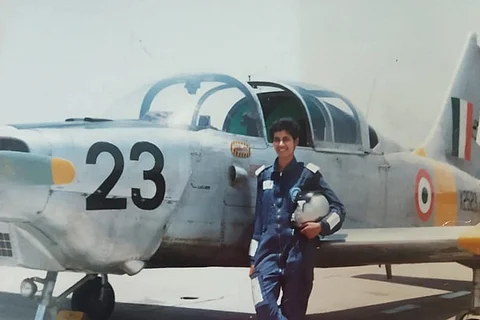

Gunjan Saxena: The Kargil Girl released on Netflix last week to generally positive reviews. However, the film has been criticised for portraying the Indian Air Force (IAF) in a negative light. More pertinently, it has completely ignored Sreevidya Rajan, a woman IAF officer who served along with Gunjan Saxena in the Kargil war.
Sreevidya, who hails from Palakkad in Kerala, and currently lives in Kottayam, took to Facebook on Monday to share her thoughts on the film. While she acknowledged that there was some amount of sexism in the IAF when she and Gunjan served, it was nowhere as bad as how it was portrayed in the film.
At the time, Sreevidya was 26 years old and had made the long journey from small town Palakkad to the Udhampur base, breaching a male bastion and making history. She comes from a family of four siblings and her father served in the army as Subedar, while her mother was a school teacher. Sreevidya is presently working as Aviation Consultant with Sri Aviation Solutions Pvt Ltd.
No, they did not.
Yes, I came to know about it much later. Gunjan is my course mate. I came to know about it from social media only. I checked with her and found out that this discussion was on.
I don't know why they didn't show me. I have no idea. That's why I wanted to clear certain things. That's why I wrote my Facebook post.
Gunjan is my course mate and friend. As far as I know, she wouldn't project the IAF in a negative way. We are all officers first and we have our own ideals. We would never project an organisation like the IAF like that. It must be the filmmakers....whatever they wanted to project, they have done so.
Yes, I was the first lady pilot to fly in a combat zone. I was about 26 or 27 at that time. I was 1996 commissioned, so by then we had already spent three years in the unit. It's an operational area and we were also trained there. We had flown in Kargil area like our male counterparts but not as much as they did during the war.
I had undertaken casualty evacuation, SAR (Search and Rescue), communication sorties.
After completion of training, we were posted to Udhampur. That was in ‘96 and Kargil happened in ‘99. We had been operating in Jammu and Kashmir, Punjab, Himachal Pradesh...we were quite experienced by then.
In any work area, there is sexism. Especially in Defence and in that unit, there were no lady officers at all. So they were skeptical. They wondered if we would be able to perform the way the male officers performed. It is a high risk job. But we had to fight our way through and we had to prove ourselves. We proved our worth and we were accepted eventually. In fact, only initial few weeks this was there. When we started flying, people realised that we are also competent. There was no problem after that. There were a few people who did feel that "Oh girls have come and they're flying, especially in a volatile place, will they be able to cope?". But we did and everything was fine.
I wanted to become a pilot! In those days, we had only civil aviation and flying classes were very expensive. Now also it is! At that time the IAF started inducting ladies and I had the right opportunity. I applied and joined.
My parents did have their share of tension, with me joining Defence and that too going to fly. It's a very risky job. But both of them were very supportive and very proud of me going from Palakkad. I had to work very hard to get through and it was very tough...it's not like how it was shown in the film.
It is a biopic, it's somebody's story that you're going to tell. The facts should be right. To begin with, the movie doesn't even show that there were two lady pilots who flew there. They have shown women to be very weak and oppressed, as if we were tortured. All the male officers were shown in a negative light and constantly insulting her (Gunjan). Such things never happened.
It was tough. It's not an easy job to go and fly. It was the responsibility of the senior officers to teach us. But there was no humiliation or ill treatment as shown in the movie. They were very respectful towards us. Hardly a handful of women had gone into flying at that time and they know how hard it is for us to reach up to that. And unlike civil aviation, you don't get n number of sorties. You have a limited number of sorties to clear your tests. There's a lot of studying and training. After doing all this, when we reach there, everyone respects you.
I was there till 2004.
(Laughs) No. I have never given out any interview. I was not keen on the limelight. Right now, I'm forced to give an interview because the whole picture has shown the IAF and the officers in a negative way. And somebody has to clear this or no girls are going to join this organisation. The film shows that this is how women will be treated. Movies should be inspirational...you are scaring them off.
My husband, Wing Commander Jayachandran, also served in the IAF. He left in 2012. He's from Thiruvananthapuram. I met him at the Air Force Academy. He was my senior there. My daughter Diya is studying in BCM College, Kottayam.